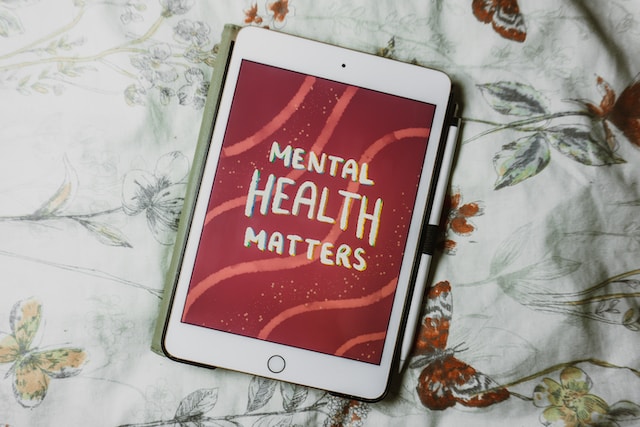Mental Health and Wellbeing
Some listeners and readers may be triggered by this content and listener and reader discretion is advised.
Mental health is a complicated and frequently misunderstood subject. It affects millions of individuals worldwide and there is a lot of shame and discrimination attached to it. In this post, we will talk about mental wellbeing, discuss mental distress, its causes, and symptoms, and how to navigate the mental health care system. We'll also talk about coping mechanisms, the value of self-care, and how to manage stigma and discrimination. Mental health can be a very challenging journey and it’s important we start talking about it openly.
In this week’s episode of the podcast, we met Kitt O'Malley, an author, mental health advocate, public speaker, and former psychotherapist who lives with bipolar disorder. She has experienced depression so deep that it was a living hell and mania so severe that she was psychotic. There is help. Psychotherapy, medication, and coping skills have enabled her to live a fulfilling life.
Acceptance has been key to her mental health recovery.
In Kitt's memoir, Balancing Act - Writing Through A Bipolar Life, she shares how she balanced living with bipolar disorder with her work as a mental health advocate and caretaker of her son and parents. Her book offers hope to those living with mental health conditions and their loved ones and tells how her mental health journey has given her purpose.
“Just because no one else can heal or do your inner work for you doesn’t mean you can, should, or need to do it alone.”
- Lisa Olivera
So, let’s dive in and explore the complex world of mental wellbeing and distress. Mental health plays such a crucial role in our lives that it certainly needs to be highlighted.
What is Mental Health?
Mental health is not just the absence of mental distress, as the World Health Organization puts it. Mental health means being able to function in society and being able to cope with daily stressors you encounter. It also means being able to live your life fully and in a way that supports your happiness and wellbeing. When this ability gets impacted negatively, mental distress can start to influence your thoughts, feelings, and behaviors. Mental distress can impair your capacity to function in daily life, create and sustain relationships, and impact your overall wellbeing. Anxiety, despair, mood swings, obsessive-compulsive behavior, and hallucinations are all common experiences when struggling with mental distress.

It is important to recognize that mental illness can have a wide variety of causes. Anybody, regardless of age, gender, culture, or background, can suffer from mental distress at any time in their lives. While the causes of mental distress are not always evident, research indicates that genetics, environmental factors, and life experiences all play a role. Understanding your experiences and what happened to you can be an important step in understanding why you are experiencing mental distress.
It is also essential to recognize that mental distress is generally treatable and manageable. You can manage your symptoms, enhance your quality of life, and move toward healing with care, support, and treatment. Getting care and support is the first step in managing mental distress. In addition, it is critical to eliminate the stigma associated with mental distress and encourage open and honest discussions about mental health.
Experiences with Mental Health
Mental distress is a widespread and severe health problem affecting millions globally. The World Health Organization (WHO) estimates that one in every four persons may experience mental or neurological complications at some point. In addition, nearly one in every five adults in the United States experiences mental distress yearly.
The figures can be frightening, but remember that mental distress can be treated and managed. The first step towards healing is to seek support. Personal accounts of people navigating their mental health and living with mental distress can shed light on the impact on their life.

A personal account of someone who has lived with depression, for example, may highlight the difficulties they had in their everyday life, such as trouble getting out of bed, lack of ambition, and loss of interest in activities they once enjoyed. It can also show how treatment, such as therapy, counseling, coaching, or medicine, might help you start on the path to healing.
Sharing personal lived experiences can also help decrease stigma and discrimination, motivate others to get help, and bring hope to those in distress. Stigma and shame are some of the main reasons why people don’t get help with mental distress. If everyone would feel safe to share and seek help, it’s likely that the number of people experiencing mental distress would decrease drastically.
Mental Health and Distress
There are numerous forms of mental illness, each with its own set of symptoms and diagnostic criteria. Some of the most frequent types of mental distress can be looked at as follows. Keep in mind that this is the medical view of mental illness. Everyone’s mental health journey is unique and may not fit neatly into a diagnostic category.
Anxiety
Anxiety disorders are defined by excessive worry, fear, or panic that interferes with daily life. Generalized anxiety disorder, social anxiety disorder, and obsessive-compulsive disorder are examples of anxiety disorders.
Mood Disorders
Mood disorders can impair your emotional state and cause extreme despair or elation. Major depressive disorder, bipolar disorder, and seasonal affective disorder are all examples of mood disorders.

Psychotic Distress
These include delusions, hallucinations, and disordered thinking, which can impair your perception and experience of reality. Schizophrenia and schizoaffective disorder are two examples of psychotic distress.
Personality Disorders
Personality disorders are characterized by rigid and maladaptive patterns of conduct that can disrupt social relationships and daily life. Borderline personality disorder, narcissistic personality disorder, and antisocial personality disorder are examples of personality disorders.
Eating Disorders
Eating disorders are distinguished by abnormal eating patterns and can have severe medical and psychological effects. Anorexia nervosa, bulimia nervosa, and binge eating disorder are examples of eating disorders.
Substance Use Disorders
These are conditions in which drugs or alcohol are used in a way that interferes with daily life and can lead to addiction. Alcohol use disorder, opioid use disorder, and cocaine use disorder are all examples of substance use disorders.
It is important to point out here that a diagnosis can be useful for accessing medication and mental health services; however, a diagnosis can also have a negative impact on the person experiencing distress. A more holistic approach to mental health may be useful to explore alongside the conventional medical approach.
How Does Mental Health Get Affected?
Mental distress can be caused by a complex and varied combination of hereditary, environmental, and social factors. This is an important thing to keep in mind when trying to start your healing journey. Often, if situational or environmental changes cannot be made, the distress will continue until things change in your life.
Hereditary Factors
Some mental disorders may have a genetic component, which means it can be handed down from generation to generation. Some genes, for example, have been linked to an increased chance of developing schizophrenia or bipolar disease, according to research.
Environmental Factors
Trauma, abuse, neglect, poverty, Adverse Childhood Experiences, or chronic stress can all contribute to mental disorders. Adverse childhood experiences, for example, have been related to an increased risk of adult depression, anxiety, and PTSD.

Brain Chemistry
Imbalances in brain chemicals or neurotransmitters such as serotonin, dopamine, and norepinephrine can also contribute to mental distress; however, a lot of the brain chemistry theories have now been shelved.
Substance Abuse
Drug abuse can contribute to the development of mental distress or aggravate pre-existing mental health struggles. Heavy alcohol or drug usage, for example, can result in anxiety, depression, or psychosis.
Medical Conditions
Physical problems or illnesses, such as brain traumas or thyroid disorders, can also play a role in the development of mental distress. Struggling with disability or managing a chronic or terminal illness are also known to affect your mental wellbeing.
It's worth noting that mental illness usually results from a combination of these circumstances rather than a single cause. Furthermore, not everyone exposed to these risk factors will end up experiencing mental distress. Nevertheless, understanding mental health and distress can help you become more aware of your own experiences. It can also help you advocate for your mental health in a more informed way.
Finding Mental Health Support
Outside of your doctor, therapist, counselor, or coach, there are also many other places that can provide support. Finding support groups or online communities can be an excellent resource for mental wellbeing.
Search Online
Several support organizations have websites or social media profiles that provide information about local meetings or online communities. Social media platforms such as Facebook and Reddit provide groups and forums where people may share their experiences and receive support from others.
Peer Support
Peer support groups, such as Alcoholics Anonymous or Narcotics Anonymous, offer a safe place for people struggling with addiction to support and share their stories.

Local Organizations
Local health organizations, hospitals, and community centers may offer support groups and online communities. Those struggling with mental distress might benefit from support groups and online communities, which can provide essential resources and connections. As a result, you might feel less isolated and alone in your healing journey.
Positive Mental Health Coping Mechanisms
Positive coping strategies are approaches and practices that can help you better manage your mental wellbeing and improve your physical and emotional health. It's important to note that everyone's coping strategies may differ, and it may take some time to figure out what works best for you. Getting the advice and assistance of a professional can provide extra resources and strategies for managing mental health concerns.
Self-Care
Self-care is critical for managing mental wellbeing and supporting overall health. It can include getting adequate sleep, which is critical for physical and mental wellbeing; eating a balanced diet rich in whole foods, fruits, and vegetables, to help improve general health and mental wellbeing; exercising and participating in activities you enjoy, like hobbies and spending time with loved ones; and using relaxing techniques like deep breathing and progressive muscle relaxation. Establishing boundaries with work, social media, or other stressors can help you prioritize self-care and reduce stress.
Meditation and Mindfulness
Mindfulness and meditation activities can help you manage your mental wellbeing and promote overall wellness. These techniques can help reduce stress by encouraging relaxation and decreasing unpleasant thoughts and emotions. Mindfulness and meditation can also help with symptoms such as anxiety, depression, and post-traumatic stress disorder (PTSD). There are numerous mindfulness and meditation activities, such as guided meditation, mindfulness exercises, and yoga, for example.

Physical Activity and Exercise
Exercise and physical activity can help with mental health and promote overall wellbeing. Exercise can lower stress by encouraging the release of endorphins. These brain chemicals boost mood and reduce stress. Exercise and physical activity can also improve sleep quality and alleviate insomnia symptoms, in turn helping with anxiety and depression.
Diet and Nutrition
Diet and nutrition are critical components in managing mental wellbeing and promoting overall health. A healthy diet rich in whole foods, fruits, and vegetables can deliver critical elements, including vitamins, minerals, and antioxidants that enhance brain function and boost mood. Consuming a balanced diet can help regulate blood sugar levels and reduce mood swings and weariness. An anti-inflammatory diet, which includes foods like fatty fish, nuts, seeds, and leafy greens, can reduce inflammation and promote mental wellbeing. And healthy gut flora has been linked to better overall wellbeing.
Mental Health Stigma and Discrimination
Stigma and discrimination towards mental health can create hurdles to getting care and support if you are experiencing mental distress. Stigma refers to unfavorable attitudes and beliefs about mental wellbeing, which can lead to discrimination and social exclusion. Personal experiences with stigma might include guilt, self-blame, social marginalization, discrimination, and reluctance to seek treatment. To battle stigma and prejudice, it's important to educate others, campaign for legislative change, and speak up against stigma. Helping loved ones cope with mental disorders can also be an effective method to reduce stigma and encourage awareness and empathy toward mental illness.

Personal encounters with stigma can be devastating and distressing if you are struggling with your mental health. You may experience guilt or self-blame due to negative attitudes and beliefs about mental health. Stigma can lead to social exclusion, impacting relationships, employment, and education. You might also experience discrimination in areas such as housing, healthcare, and employment. Stigma can lead to a lack of knowledge and empathy towards mental health, making it difficult for people to seek help and support.
Remember that mental wellbeing is important and anyone can experience mental distress at any time. By sharing personal experiences and educating others about mental health, we can all help reduce stigma and promote understanding and empathy.
The Takeaway
Managing mental health and promoting overall wellbeing requires a multidimensional approach that includes understanding mental illness, navigating the mental health care system, coping strategies, addressing stigma and discrimination, and seeking help and support. It's important to prioritize self-care and self-compassion and to find resources for further information and support.
Seeking help and support for your mental health is brave and necessary. By promoting understanding and empathy towards mental health, we can do our part to dismantle barriers and provide a human face to mental health and mental distress. Mental wellbeing has long been swept under the rug and kept hidden away as a taboo topic. It’s time we openly talk about it and break down the stigma and discrimination associated with it.

It is important to recognize that struggling with mental health is not a personal failing or weakness. Mental distress is common and affects millions of people worldwide. By opening up and sharing our experiences with mental health, we can help create a more accepting and supportive environment for those who are struggling.
Remember, it is okay to not be okay, and it is never too late to seek help.
Whether you are dealing with depression, anxiety, bipolar disorder, or any other mental health condition, there is hope and help available. The path to healing is worth it. By prioritizing self-care, seeking help, and building a strong support network, you can begin to reclaim your life and find joy and fulfillment.
You are not alone in your struggle.
